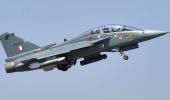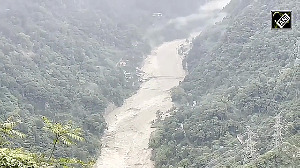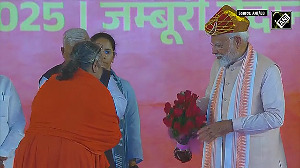Air Chief Marshal V R Chaudhari on Monday said warfare is undergoing a fundamental change with the emergence of new technology and radically newer doctrines, and India's security dynamics involve threats and challenges, which would require multi-domain capabilities and execution of operations in shortened time frames.

He was speaking after reviewed the Passing out Parade of the 142nd course at the National Defence Academy (NDA) near Pune in Maharashtra.
The NDA is the joint services academy of the armed forces where cadets receive training together before they go to their respective service academies for further pre-commissioning training.
He also said that the Indian Air Force (IAF) rising to the no. 3 position on the World Air Power Index was a matter of pride for them.
Addressing cadets after the Passing out Parade, Air Chief Marshal Chaudhari said they were joining the noble profession when the country was at the cusp of a technological transformation.
All the three (defence) services have invested heavily in the next-generation war-fighting machines, he noted.
"You, as future operators of these highly potent systems, need to be fully conversant with them which can be achieved only through rigorous training, dedication and a professional approach," he said.
As the world is embracing newer technologies and gradually moving away from conventional war fighting methods, it is 'imperative for all of us to adapt to the change rapidly so that we can innovate and refine our processes of war fighting'.
"Warfare is undergoing a fundamental change with the emergence of new technology and radically newer doctrines. India's security dynamics involve multi-faceted threats and challenges. It would require us to build multi-domain capabilities and execute operations simultaneously and in shortened time frames," he said.
He told the cadets that they will need to stay abreast with the technological advancements, for which they will have to study, research and analyse.
Later, when asked at a press conference about the IAF's ranking on the World Air Power Index, he said, "It was a pleasant surprise for us also that we are placed at the third position in the ranking...We have got a fairly robust network system which helps us plan our operations, management and maintenance."
Referring to the diversity of equipment with the IAF, Air Chief Marshal Chaudhari said they have aircraft from six different countries and a lot of indigenous products also.
"I think all these factors have made us rise to the number 3 position and we are very proud of it," he said.
To a query, he said the regional dynamics were not really going to make big difference and that their focus was on better quality training and technology.
Notably, the IAF recently signed a memorandum of understanding with the IIT-Madras to develop indigenous solutions to maintain various weapon systems.
Asked if there are more such plans, Air Chief Marshal Chaudhari said, "During the outreach programme with the Indian industry, we have found ample opportunities to have similar MoUs not only with the academia, but with the MSMEs also."
There was a push towards Atmanirbharta (self-reliance) and programmes associated with it, he said.
Talking about the IAF's modernisation, he said a contract for 83 Light Combat Aircraft (LCA) was given last year and the delivery is expected next year.
The proposal for the procurement of Medium Multi-Role Combat Aircraft is also in the pipeline, he said, adding that a contract for transport aircraft has also been signed and deliveries will begin from next year.
"We are taking more of our weapons from Indian sources. We will minimise import in future," he said.
To a question about the push towards 'Atmanirbhar Bharat' in the defence sector, he said, "All the three forces have set up departments which are directly interacting with the Indian industry. We are working on a positive indigenisation list of items, which we will not import."
Those will be made in India, even if it takes more time, he said.
To a question on the impact of the Russia-Ukraine war on India's defence sector, he said, "We are dependent on Russia for a large number of items, but the war has not made a major impact on it as our spare stocking policy is robust. We have already catered to the future requirements.
"We have indigenised a large number of spares that we have been importing from Russia for many years."











